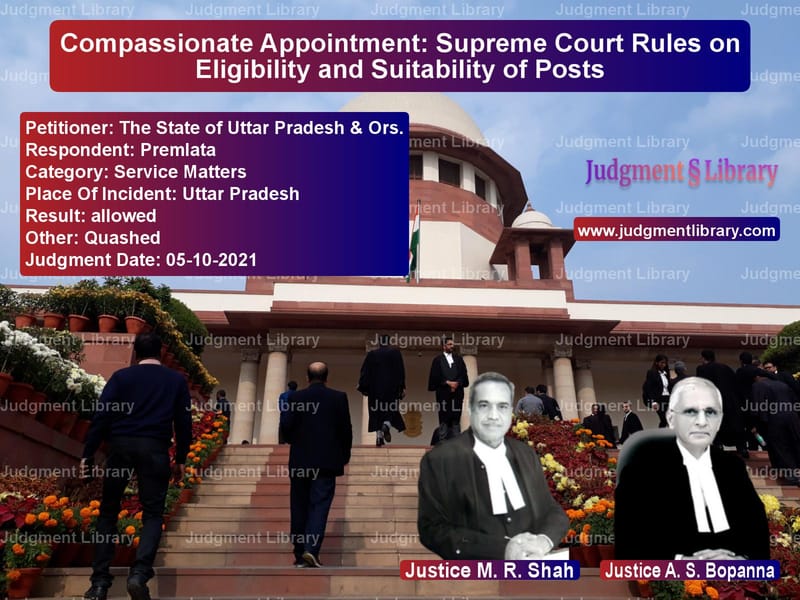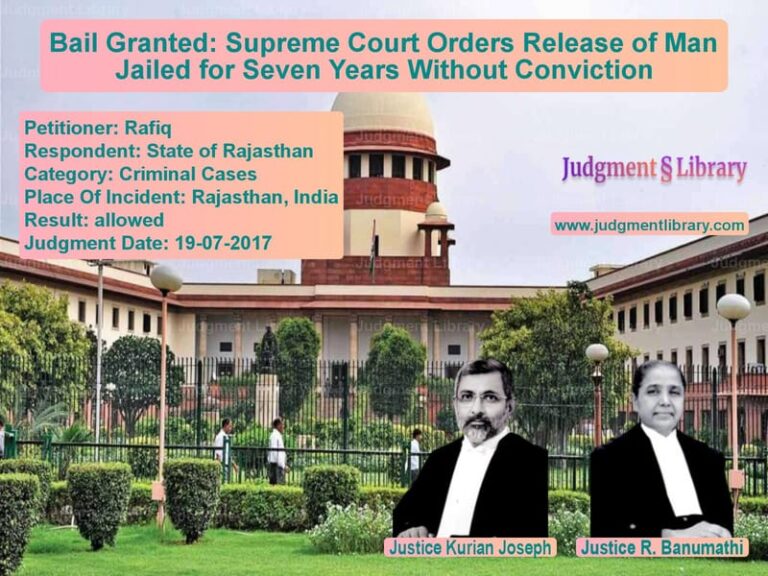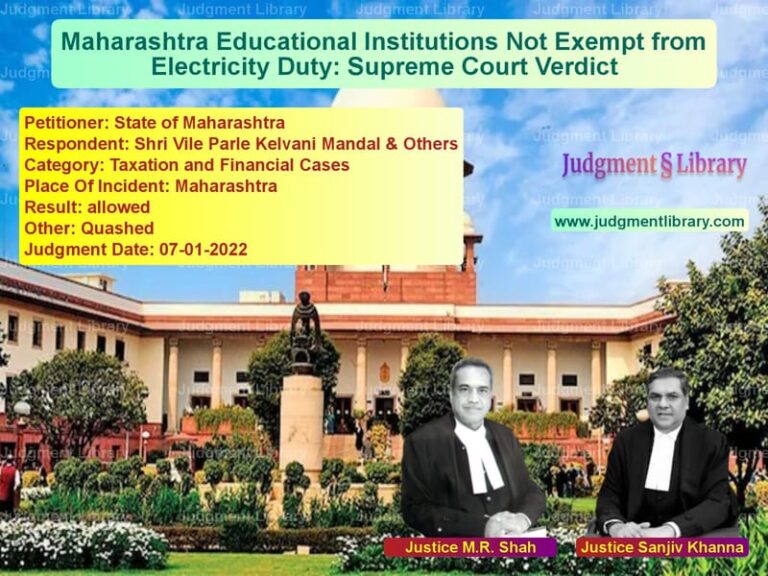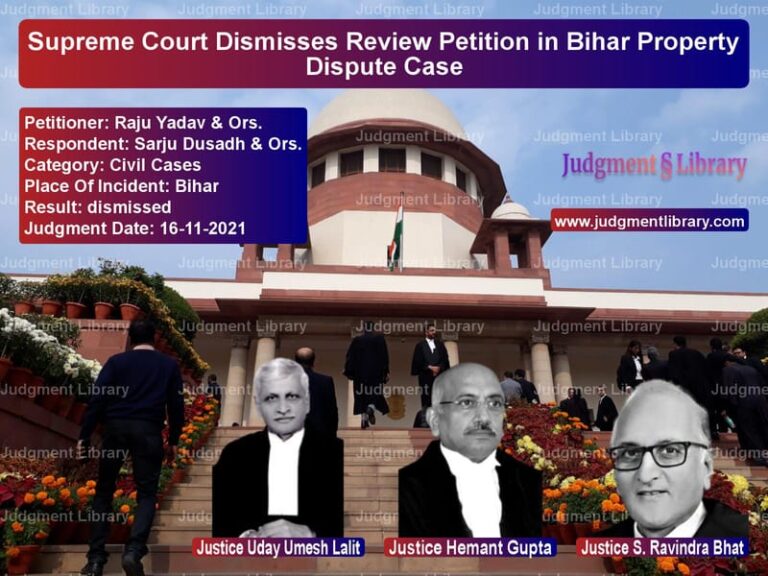Compassionate Appointment: Supreme Court Rules on Eligibility and Suitability of Posts
The Supreme Court of India, in the case of The State of Uttar Pradesh & Ors. vs. Premlata, addressed the critical issue of compassionate appointments and the interpretation of ‘suitable post’ under the Dying-in-Harness Rules, 1974. The Court held that the appointment must be linked to the post held by the deceased employee and not merely based on the educational qualifications of the dependent. This ruling reinforces the principle that compassionate appointments are an exception to the general rule of public employment and should strictly follow the framework established by law.
Background of the Case
The respondent, Premlata, was the widow of a deceased government employee who served as a Messenger in the Police Radio Department of Uttar Pradesh, a Class-IV post. After her husband’s death on November 7, 2014, she applied for a job under the Dying-in-Harness Rules, 1974, which provides for compassionate appointments to support the deceased employee’s family in financial distress.
Initially, she applied for the post of Assistant Operator, a Class-III position. However, her application was rejected as she did not meet the required eligibility criteria. She then applied for the post of Workshop Hand, another Class-III position, but failed the physical fitness test conducted on January 28, 2018.
Read also: https://judgmentlibrary.com/supreme-court-upholds-bar-councils-decision-in-lawyer-misconduct-case/
Since she was unable to clear the physical eligibility test, the Police Radio Headquarters of Uttar Pradesh offered her the post of Messenger, equivalent to her deceased husband’s post. However, she refused the offer and filed a writ petition before the Allahabad High Court, seeking appointment in a Class-III position.
Legal Proceedings
Single Judge’s Ruling
The learned Single Judge of the High Court dismissed her writ petition on July 31, 2018, ruling that since her husband was a Class-IV employee and she was offered a Class-IV post, she had no legal right to demand a higher post under compassionate appointment.
Division Bench’s Decision
Premlata appealed the decision, and the Division Bench of the High Court overturned the Single Judge’s ruling on September 14, 2018. The Division Bench observed:
- The term ‘suitable post’ under Rule 5 of the Dying-in-Harness Rules should be interpreted in relation to the educational qualifications of the dependent, not the post held by the deceased.
- Since Premlata had a Bachelor’s Degree in Arts and Education, she was qualified for a Class-III post and should be considered for appointment accordingly.
- The government must reconsider her application and offer her a position commensurate with her qualifications.
Aggrieved by this decision, the State of Uttar Pradesh filed an appeal before the Supreme Court.
Arguments Presented
Appellant’s (State of Uttar Pradesh) Arguments:
- The Division Bench misinterpreted Rule 5 of the Dying-in-Harness Rules, 1974.
- Compassionate appointment is an exception to the general rule of public employment and is meant to provide financial relief, not a right to a specific post.
- The term ‘suitable post’ must be linked to the post held by the deceased employee.
- Offering a higher post based on educational qualifications would violate the principle of merit-based recruitment under Articles 14 and 16 of the Constitution.
- Premlata had already been given an opportunity to apply for a suitable post, but she failed the physical fitness test.
Respondent’s (Premlata) Arguments:
- The term ‘suitable post’ must be interpreted based on the dependent’s qualifications, not the deceased’s post.
- She was not demanding a specific position but should be considered for any Class-III post for which she was eligible.
- The government’s policy of allowing only one opportunity for a compassionate appointment should not apply in her case as her application was submitted before the policy change in 2015.
- There was no absolute restriction in the Rules preventing dependents from being appointed to higher posts.
Supreme Court’s Ruling
The Supreme Court set aside the judgment of the Division Bench and upheld the ruling of the Single Judge, rejecting Premlata’s claim for appointment to a Class-III post. The key observations made by the Court were:
On the Purpose of Compassionate Appointments:
The Court reaffirmed that compassionate appointments are not a right but a concession granted to support the family of a deceased employee in financial distress. It cited the case of Umesh Kumar Nagpal vs. State of Haryana, stating:
“The object of compassionate appointment is to enable the family to tide over the sudden crisis. It is not meant to provide the dependent with a post equivalent to or higher than the deceased employee.”
On the Interpretation of ‘Suitable Post’:
The Court clarified that ‘suitable post’ must be linked to the post held by the deceased employee and cannot be determined solely based on the qualifications of the dependent.
“If a dependent of a deceased Class-IV employee has a higher qualification, it does not entitle them to a Class-III post under compassionate appointment. Such an interpretation would blur the line between compassionate appointments and regular recruitment.”
On Premlata’s Case:
The Court observed that she was offered a Class-IV post equivalent to her husband’s, which she refused. Her failure to clear the physical test for the Workshop Hand post further disqualified her from seeking an appointment to a Class-III post.
Legal Precedents Considered
The Court cited several past judgments reinforcing its decision:
- State of Himachal Pradesh vs. Shashi Kumar (2019) – Compassionate appointments are an exception and cannot be claimed as a right.
- Director of Treasuries vs. V. Somashree (2021) – Appointment must align with the deceased employee’s post.
- Govind Prakash Verma vs. LIC (2005) – The purpose of compassionate appointment is immediate financial relief, not career advancement.
Conclusion
The Supreme Court’s ruling in this case sets a precedent for how ‘suitable post’ should be interpreted under compassionate appointment schemes. The key takeaways from the judgment are:
- Compassionate appointment is a relief measure, not a right.
- The post offered must align with the deceased employee’s position.
- Educational qualifications alone cannot determine eligibility for a higher post.
- Refusal of an offered post does not grant the right to demand a higher post.
This ruling ensures that compassionate appointments remain a mechanism for financial support rather than a means of bypassing regular recruitment procedures.
Petitioner Name: The State of Uttar Pradesh & Ors..Respondent Name: Premlata.Judgment By: Justice M. R. Shah, Justice A. S. Bopanna.Place Of Incident: Uttar Pradesh.Judgment Date: 05-10-2021.
Don’t miss out on the full details! Download the complete judgment in PDF format below and gain valuable insights instantly!
Download Judgment: the-state-of-uttar-p-vs-premlata-supreme-court-of-india-judgment-dated-05-10-2021.pdf
Directly Download Judgment: Directly download this Judgment
See all petitions in Employment Disputes
See all petitions in Recruitment Policies
See all petitions in Public Sector Employees
See all petitions in Judgment by Mukeshkumar Rasikbhai Shah
See all petitions in Judgment by A. S. Bopanna
See all petitions in allowed
See all petitions in Quashed
See all petitions in supreme court of India judgments October 2021
See all petitions in 2021 judgments
See all posts in Service Matters Category
See all allowed petitions in Service Matters Category
See all Dismissed petitions in Service Matters Category
See all partially allowed petitions in Service Matters Category







